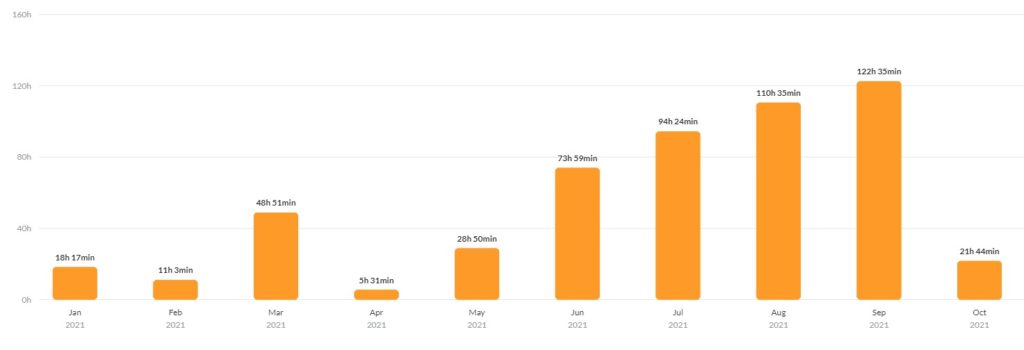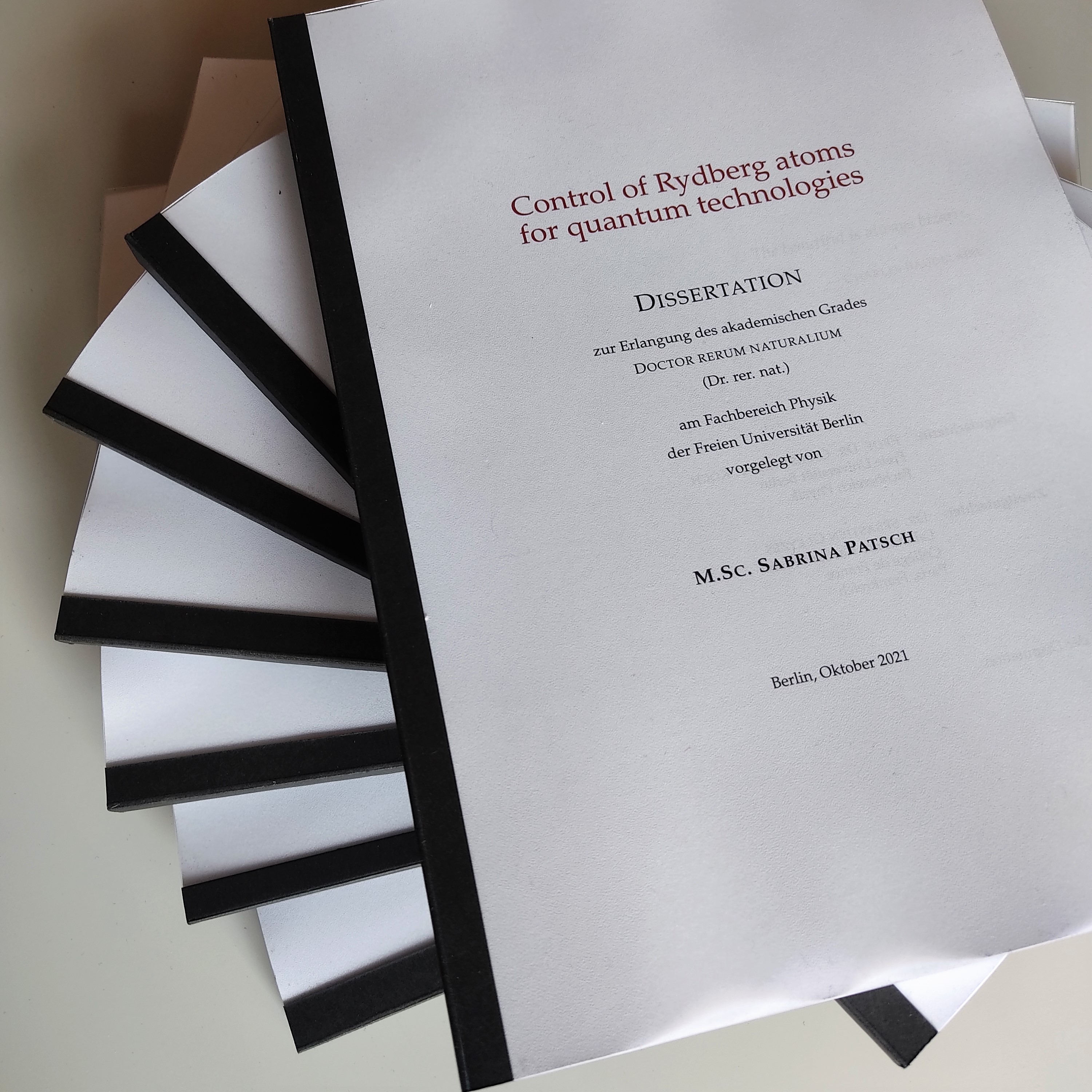It’s been a bit quiet on my blog for the last few months, but finally I have some good news: my thesis is finished! Yippee yay, it’s done! Today I want to review the process with you, tell you about my experiences, think a bit outside the box and tell you why it’s not over yet.
I am a physicist and like numbers, statistics and diagrams. At the age of eight, I was already meticulously documenting my rabbit’s measurements, from its weight to the length of its ears. So prepare yourselves for a detailed and somewhat unusual look at my thesis!
705g is the weight of this beauty. This makes it lighter than a newborn (although funnily enough it also took nine months to bring it into the world) and rather as heavy as a dwarf rabbit. 1.2cm thick, printed in A4 format. So that makes 750mL of research. About three cups of coffee (my daily writing requirement) or the average volume of a human breath. Poetic.
A bit more conservative is the page count: 237 pages, 188 pages main text, the rest cover page, appendix, bibliography, and so on. This corresponds to about 480 pages of a normal bound book (because of the smaller format) – as much as the third Harry Potter volume! An apt comparison, I think. After all, the doctoral thesis is also volume three of my scientific career, after the bachelor’s and master’s theses. And quantum physics is also just a very mathematical form of magic.
“War and Peace” or “Chronicle of the Cthulhu Myth”?
My doctoral thesis is a monograph. A monograph is a comprehensive, self-contained work, i.e. a “book” on a certain topic. 250 pages for it is good upper middle ground in physics; in my experience, it varies between 150 and 300 pages. On a side note: Wikipedia says that scientific dissertations vary between 30 and 150 pages – I think that’s an outright lie.
The alternative to a monograph is a thesis by publication. In this case, the academic publications published during the doctoral period are, to put it bluntly, stapled together along with an introduction and summary and handed in. A thesis by publication is usually much shorter than monographs; more like 150 pages or less and a large part of them are the copied-in publications. So what possessed me to write a monograph?
Simply put, I had no choice. Some universities do not allow this option. Other universities require a minimum number of publications for a thesis by publication. At the Free University of Berlin (my university) it is four. I had three. But many PhD students voluntarily opt for a monograph, even if a thesis by publication would be allowed, simply because of the completeness. In a monograph, the physical foundations, results, details, and also failures can be discussed in detail. Things for which there is usually no room in publications. So I could simply hand my doctoral thesis to my successor, and he/she would have everything necessary to understand my work and continue working on it.
What about in other disciplines? A friend of mine finished her dissertation the same week I did. She is an archaeologist and her dissertation is 1008 pages long. A thousand pages! I don’t want to be the professor who has to read that all the time. And certainly not the doctoral student who has to write such things. But that’s not all there can be: the longest dissertation is by a historian and is about sailing – it’s 2200 pages long, almost twice as long as the Gutenberg Bible. The shortest dissertation, on the other hand, is only three pages and deals with “Natural Medicine against Impotence in Medieval Persia”. I guess there wasn’t much to say about that.
Ctrl+C, Ctrl+V, return: phd_thesis
Speaking of Guttenberg. Nowadays it’s very hip to take politicians’ doctoral theses apart and check them for plagiarism. Very famous Karl-Theodor zu Guttenberg or recently Franziska Giffey (even FU Berlin), both German politicians. If you click through the list of plagiarism cases, the natural sciences are conspicuously inconspicuous. In oversimplified words: in the natural sciences, inconspicuous copying is not so easy. While the humanities and social sciences are often about comparative literature analysis, the natural sciences are about data, calculations and the like. Since research communities are very specialised and small, people know each other and it is quickly noticed if I steal results from Thomas or Susan.
Don’t get me wrong: scientific misconduct unfortunately also exists in the natural sciences. It’s just that it’s usually a bit more complicated than just copying. The other day I already mentioned the case of Jan Hendrik Schön. Just recently, there was another case in physics that also attracted a lot of attention because it again involved the FU Berlin (as was the case with Giffey just a short time before). A professor who had received several awards had falsified and invented data for years. Such things are difficult to discover and usually only come to light if several scientists try in vain to reproduce results. The professor in question was allowed to keep his PhD if he left the university in return. This shady procedure did not reflect well on the FU.
Ghostwriting – PhD theses from the beyond
Another dubious practice is the ghostwriting of PhD theses. Ghostwriting is a service in which professional authors write texts without their name appearing in the final product. Ghostwriters are popular with celebrities who publish an autobiography or with busy politicians. Generally speaking, there is nothing to it. If you’re busy or don’t know how to write, let the professionals do it.
Recently, however, I discovered that many websites offer ghostwriting for doctoral theses. Completely openly and without shame. For 50€ per page, you get a dissertation written by experts delivered to your home (that would be a whopping 12,500€ for my dissertation). To be honest, I was quite shocked by that. What is it all about?
An academic thesis (bachelor’s, master’s and doctoral thesis) is an examination paper and you enclose a statement with it in which you affirm that you have written the thesis independently. To make a long story short: Ghostwriting is an attempt to cheat and not permitted. It is true that in ghostwriting a contract is concluded in which the actual author undertakes to maintain confidentiality about their own authorship and signs over all rights to the client. But this does not change anything for the examinee, who has now lied in the affidavit. So why is there academic ghostwriting? Ghostwriters are not liable to prosecution, and support in the form of literature research or editing service is legal. Likewise, a “sample doctoral thesis for inspiration” is not illegal, if you know what I mean *cough*.
Research from Berlin to Santa Claus
Let’s get back to my own PhD thesis. As explained here, the way a PhD in physics works is that we first do research (in my case: four years) and then write everything down. I already said that it took me nine months to write. But I wanted to know more precisely and got myself a Timeular Time Tracker at the beginning of the year. And now I can say: it took me exactly 535 hours and 55 minutes to write my thesis. 22 days, 7 hours, 55 minutes. According to Google Maps, I could have walked 2600km from Berlin via St. Petersburg to Rovaniemi, the home of Santa Claus, in that time. That would definitely be an achievement, too.
With a 40-hour week, it would have taken just under three and a half months. But then why did I take nine, from mid-January to mid-October? Unfortunately, (academic) life doesn’t stop all at once just because I decided to write. I had to complete my research “on the side”, lead an exercise group, give lectures, and so on and so forth. In fact, my nine months looked like this:

By the way, I took a week off in September, so that’s pretty much a 40-hour week. I didn’t include any breaks in the counting. No making coffee, no going to the toilet, no scrolling on Instagram, certainly no lunch break. I’ve noticed that working a full eight hours is a lot harder than I thought. When my tracker showed me “only” 9.5h of work, I was practically sitting at my desk from 9am to 10pm.
You don’t give in, you give up
How have the last nine months been for me? I write a blog, you’d think I’d enjoy writing and the dissertation wouldn’t have been a problem. Unfortunately, that’s not entirely true. I’ve actually been under constant stress since April. That’s when the semester started and I was involved in teaching, so I never had as much time for writing as I wanted. That was over in August and by then I had also finished a first version of the main text of all chapters. Sounds good? I thought so, but it went downhill from there.
Then it was time for polishing and correcting, filling in those pesky gaps and details I’d left blank in the first round. Then came corrections from proofreaders that were somewhere between “ok” and “maybe I’ll become a rabbit breeder after all”. The more I completed, the bigger the mountain of work seemed that I still had to do.
By the time everything was “done” – three months after my original target date – I was burnt out and dissatisfied. I still had a long list of “things to improve if there was still time”, but for a week now I had the feeling that things were no longer getting better and were only getting different, in some cases even worse. Every fibre in my body resisted going to my desk.
At that point, I decided to hand in. Not because the work was “perfect” – I was probably never as dissatisfied with the work as I was on the day I handed it in – but because I couldn’t take it any more. On the way to the print shop I was shaking and feeling sick, I was about to turn around and add another week of work.
Why am I telling you this? Not to gain sympathy, to sound melodramatic or to denigrate my work. But to show the enormous psychological strain I was under. I completely overworked myself without even having a deadline. I could go into more detail (and probably will in a future post), but for now I’ll leave it at that.
Regeneration
Relief then came rather slowly. Handing in the work entailed a rat’s tail of tasks that had either been left undone over the last few months or needed to be done soon due to stupid coincidences. It took almost a week and a half until I actually had some time off.
But it’s not quite over yet, because in a few months the final boss will be upon me: the oral defense of the thesis. At the moment, however, I’m trying to block that out and enjoy the feeling of happiness that is slowly setting in. Doing nothing for a bit. Finally pursuing my hobbies again. Like this blog.
Do you like what you read? Then you can buy me a coffee here! You might also like my other articles from the “How to PhD” series. And if you don’t want to miss any new posts, don’t forget to subscribe to my blog.








